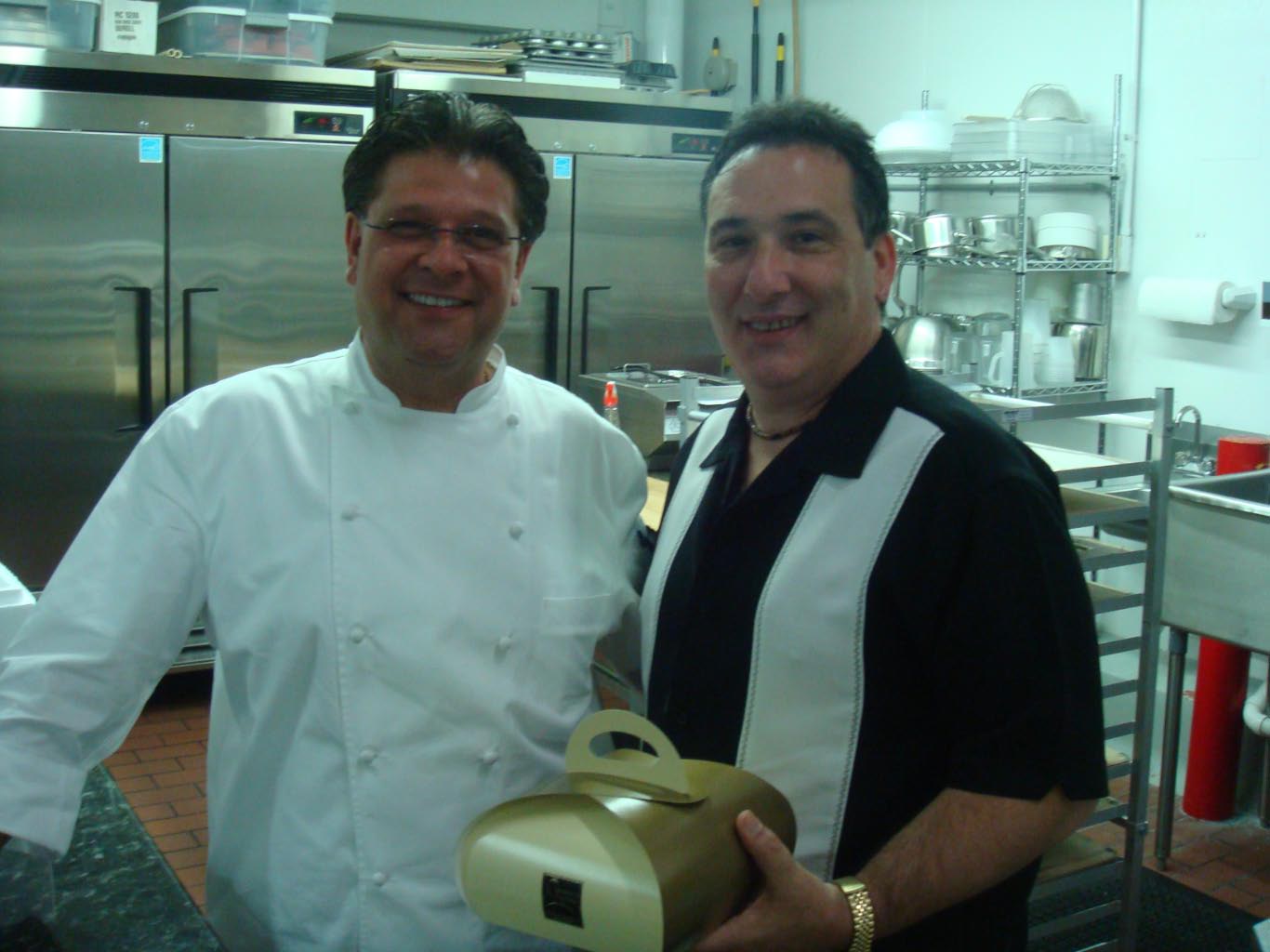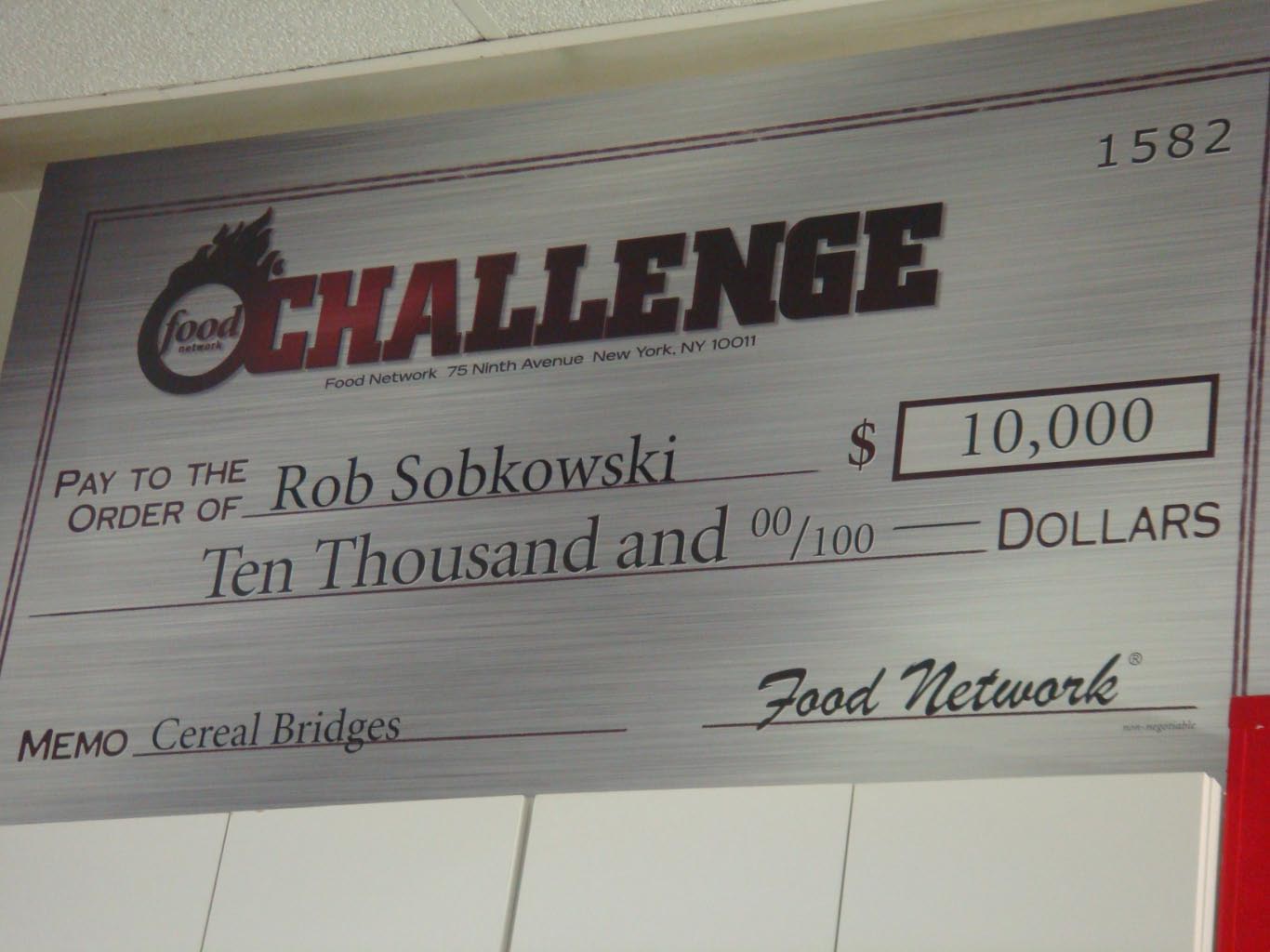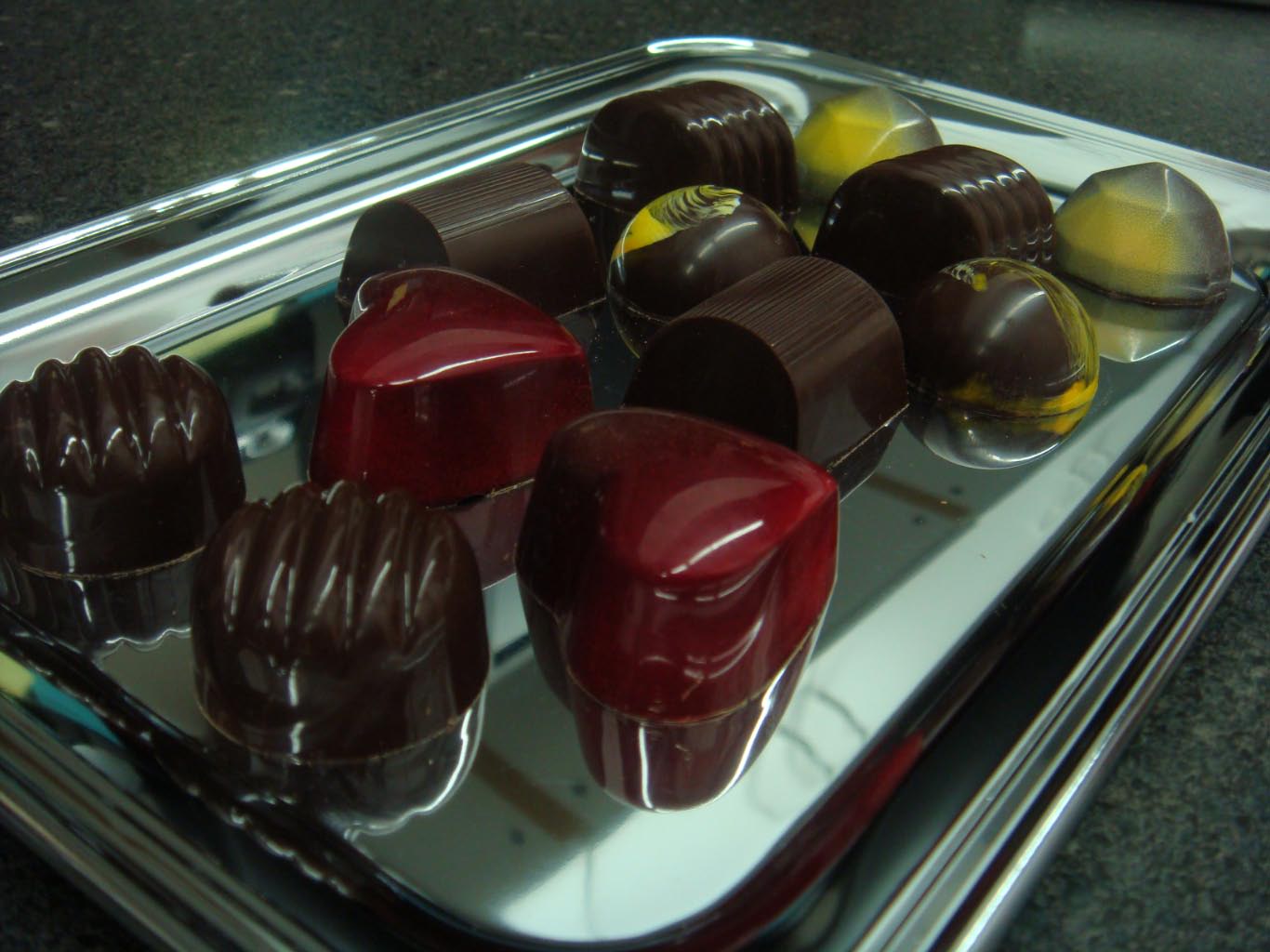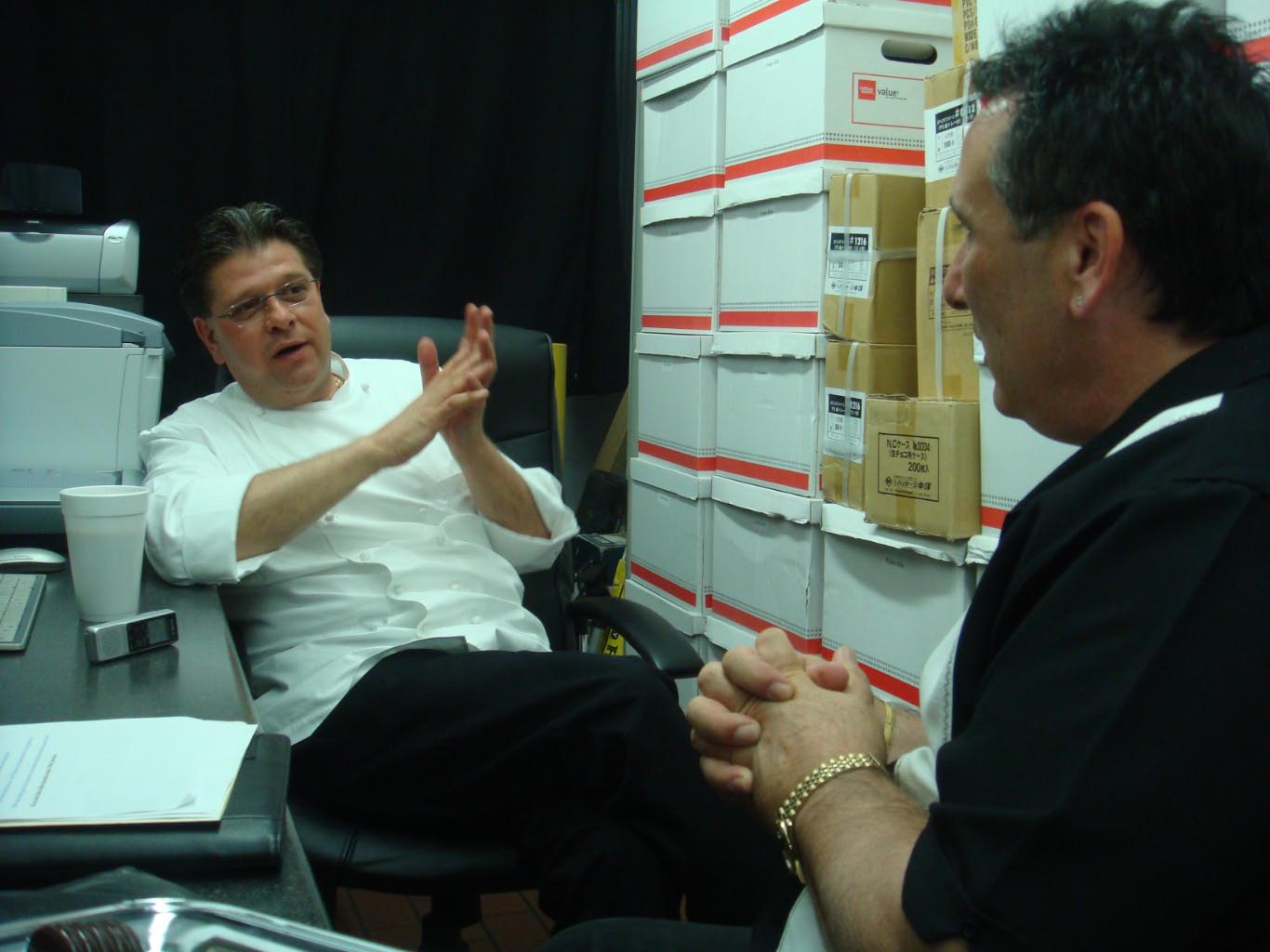Chef Rob Sobkowski, Sensational Chocolates
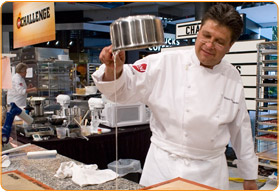 You've seen him on Foodnetwork's Challenge. You've certainly seen him on Miami's Channel 6.
You've seen him on Foodnetwork's Challenge. You've certainly seen him on Miami's Channel 6.
Chef Rob began his baking career at the age of ten at Piazza Bakery in Staten Island, N.Y., which was owned by his grandparents. While growing up he received intensive training by his father and grandfather, and upon graduating high school he assumed the position of full time decorator. In 1978 Chef Rob moved to Florida and a year later he and his father purchased Melody Diane Bakery in Sunrise and remained there as an owner-operator for ten years.
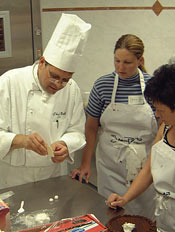 Chef Rob began teaching for The Art Institute of Fort Lauderdale in 1993 and has also taught at Johnson and Wales in Miami, Florida Culinary in Palm Beach, and The French Culinary Institute in Manhattan. He is a Certified Executive Pastry Chef, a Certified Hospitality Educator and a Certified Master Baker. He has received numerous accolades for his pastry, sugar, and chocolate work, including two gold medals awarded by The American Culinary Federation.
Chef Rob began teaching for The Art Institute of Fort Lauderdale in 1993 and has also taught at Johnson and Wales in Miami, Florida Culinary in Palm Beach, and The French Culinary Institute in Manhattan. He is a Certified Executive Pastry Chef, a Certified Hospitality Educator and a Certified Master Baker. He has received numerous accolades for his pastry, sugar, and chocolate work, including two gold medals awarded by The American Culinary Federation.
Sensational Chocolates, which Chef Rob opened in 2004, came about partly out of desire for more creative challenges and partly because of the emerging market for premium chocolate. “After teaching for 14 years I had become frustrated and felt all of my knowledge could be put to better use. At the same time, I watched many of my peers start successful high end chocolate companies in the wake of public demand for higher quality chocolate and I thought why not me? So, Sensational Chocolates was born. I am very proud of not only the chocolates but the flavors, packaging and the total experience. My goal is to provide the ultimate chocolate experience.”
Truly delectable chocolates, decadent pastries. It is indeed our pleasure to bring you Up Close & Personal with Chef Rob Sobkowski.
The Interview
GGM: You do a lot of competitions. You seem to like doing them. RS: I don't compete as much as I used to. Something like that (FN Challenge) is great exposure. The last show I wasn't too happy with because they didn't show me that much. GGM: Why is that? RS: I wasn't having any problems. TV is all about 'challenges' or problems that arise. It's all about drama. GGM: You've won quite a few awards...of all the accolades, which one means the most. RS: The gold medal from 1997 ACF Awards. It was the first year they also wanted the display to be edible. GGM: Why was that one so important. RS: I beat out a hotshot. After that I got looked at so much differently. I got more respect from the chefs. GGM: ...your peers, not just the people eating your food... RS: Obviously the standard is much higher among your peers and professional chefs. GGM: (Lou) I was a musician for a long time ... RS: Then you know exactly what I'm talking about. Musicians play for other musicians. They don't play for the people. GGM: That's exactly right. The accolades of your peers, that prestige. Although it seems from what I've heard about you, in the scheme of things, awards have their place. But it's no big deal. RS: I never took it seriously, I don't know why. I think that's why I never got as famous as some of the other guys that I see. Some were snooty, to me it's second nature. It's fun. GGM: How did you get picked for the Foodnetwork Challenge? RS: The first one was when I came out of the cooking school. They sent an email to all honor students. I don't know if they were short chefs or what. I called them and they asked for a bio and some pictures. I sent them a DVD, as I'm on Channel Six all the time. They watched it for two hours and called me and told me I'm in. They said the producer loved me. He turned out to not like me so much, because I don't get nervous. So we drove up to Minnesota and did that one. It was the first one and I was really nervous. I didn't finish. My piece was spectacular but I didn't finish. The judges liked the Minnesota lady, her family was all there. I was very upset. Then I found out she (the winner) died. I said, "you know what, that was God's gift. It was her last day." I hope my last day on earth is that recognized. GGM: She passed away like twelve hours after the show correct? RS: Yes, very tragic. Puts things in perspective. Made losing to her not feel so bad. GGM: She got a $10,000 dollar check and a gold medal. RS: She didn't get a check, you get this thing here (He points to the big check.) You don't get the check for at least a month. She didn't even see the money. GGM: We watched that episode. She did a great job, she was definitely the sentimental favorite. We're in the business and if you don't want to talk about it that's fine. We'd like to talk about the behind the scenes and about what people think they see. What was the thing that surprised you the most, that the public wouldn't know about, concerning these types of competitions? RS: It may be stupid but most people don't know how much of your own money it costs to go to those things. You bring all your own food, your own equipment, you have to ship it. GGM: Yeah, but you're on TV. RS: The only thing they provide for you is the stove. I mean they fly you there and put you up and everything. GGM: Some have said that there is a certain amount of 'staged drama' and that they like drama. RS: They love drama. I never saw any staged. There is usually plenty enough of it. (Laughter) GGM: Obviously they are going to focus in on the more dramatic. RS: That was one of the problems that I had. Did you see the popcorn show? GGM: Yes we did. RS: That producer pulled me aside and said, "You have to start acting nervous. I know you are a cool guy and you're having fun, but you have to look nervous." GGM: Now chef, wouldn't you call that staged? RS: Well, maybe they tried to make me look nervous. GGM: It's just that we know perception is everything. People believe what they think they see and a lot of times it's not what it appears to be. What was the biggest challenge being in that setting? For instance, let's take the Candy Castle Challenge. You've got all those extra lights producing extra heat. RS: That wasn't bad. The worst part was being in a different location. Those candy canes did mess me up. I would have swept that lady away. But that's what messed me up. I don't know if you are familiar with cooking sugar, but when you go from Florida to Minnesota, the same recipe's not gonna work. GGM: Two completely different environments. RS: Exactly. The humidity, the altitude. After the first time, I should have just adjusted the second time. I tried it again and again. The next time I brought isomalt, I didn't use real sugar. If I had that the first time it wouldn't have crystalized. I was trying to show as much skill as I possibly could. GGM: You're self taught. We're did all these skills come from? Do you spend hours working to perfect them? RS: I used to work at Main Street Bakery. Sometimes I would ice 100 cakes a day. That's one of the great things about being a workaholic. Working so much you get to keep practicing and practicing. Some of it is inborne. As a musician you understand. I tried to play the saxophone. I never learned how to play one song. I took lessons for two years, couldn't do it. It just wasn't in me. I can pick up a pastry bag. When I was a teacher some kids would pick up a rolling pin and they were like Mozart. Some people can try so hard and they can't roll out a piece of dough. A lot of it, I think, has to be inside of you. GGM: I agree with that to a certain extent. However, you have taken it to the next level. These are highly technical skills. RS: Understanding what's going on, as a teacher you get access to all these resources, tapes and books. GGM: Plus you taught yourself the science of food. RS: That's the main thing. GGM: Let's talk about your chocolate. You are very stringent with regard to the Swiss chocolate that you represent. What is it about the criollo that makes it the only bean you'll use? RS: The criollo bean is the rarest bean in the world. It makes up only 10% of all the cocoa grown. At the time I picked this I didn't even really know that much about it. I'd dealt with this with Chalet, the company that imports all the chocolate. When I decided to start the company I said let me try all the chocolates that you import. So I tasted them all and I happened to pick this one. I liked it the best. GGM: It wasn't about knowing what the percentage was, or the purity? RS: I knew I wanted dark chocolate for sure. I knew that it was a Grand Cru, but I wasn't familiar so with the criollo bean. About a year and half after I started the company, the Italian Pastry Council actually picked that as the best chocolate overall in a blind taste. It was 30 points above the 2nd place winner. That made me feel even better, because I picked it before I knew that. Now all of a sudden criollo is getting a lot of press and more people are becoming aware of the health benefits. GGM: You think that's because people are becoming more food savvy with the internet? RS: Yes, the internet and I think all this dark chocolate is good for you. If you look back, which I really don't think is going to happen, at the time I started the company, I thought chocolate would be the next coffee. If I'd have told you 10-15 years ago that you would pay $5.00 for a cup of coffee, you would have laughed in my face. Now it happens every day. I thought chocolate was going to be the next thing that people were going to start paying for. I really don't think it's going to happen though because chocolate in this country is still perceived as a candy. GGM: In Europe it's actually considered a 'food.' RS: Sure, candy is sugar. Snickers is candy. This is a fine food. GGM: I could make a meal out of just this. RS: Chocolate was a drink when it was first discovered. It wasn't until the 1800s when it was developed into milk and dark chocolate. GGM: (Biting into a sample) Wow, Chef this is ridiculous! Now we have a chocolatier for the magazine and I have to say he is good, from Belgium.
RS: Belgium makes good chocolate and Swiss too. The Swiss and Belgians have always been famous for the smoothest melt in your mouth. But they never hit the flavor that much. They don't care about where the beans come from. They care more about processing. GGM: Texture RS: Exactly, it melts in your mouth. But now the Swiss started with these Grand Crus and for the first time they are focusing on flavor. Plus they put their experience with the smoothness behind it and I think they've got a winner. We've got a savage chocolate, wild cocoa beans from Bolivia they aren't even on a plantation. Another one from the Dominician Republic that's actually organic cocoa beans, a cross between the criollo and Trineterio, 74%, it's got more bite. GGM: I have another question about the beans. What is it that is different about the criollo bean that makes it translate to a better taste for me, the consumer. I'm a layman, what is it about that bean that makes it taste so good?RS: It's the nature of the bean, like the difference between a tangerine and an orange. What makes a cabernet better than a pinot? GGM: Do you do pastries any more, or are you strictly chocolate? RS: Actually we are doing more pastries. 90% of the business was with realtors. Every single time they got an application or closed on a mortgage, they'd send me an email, "Send chocolate to..." I was running all over town and shipping all over the place. Last year I had a corporate account with Wachovia. With shipping and gas costs it got so cost prohibitive. Christmas time I was doing 100-200 boxes at a time. GGM: You're still doing chocolate? RS: We're still doing it. We focusing on supplying hotels and work with florists. GGM: You are shipping all across the country? RS: More so around the holidays. GGM: So you're back to what you started with doing pastries. RS: Individual desserts equals higher profit margin, and in fact, sometimes it's more fun. The chef calls me up and says here's the menu what can we do for dessert? We brainstorm to develop one. GGM (Chef Brian): Are the raw ingredients more expensive for pastry then they are for chocolates? RS: If I have a heavy chocolate month I'll spend several thousand dollars. The cost of cream and butter has come down. GGM (Chef Brian): Is the labor more intensive with pastry? RS: I don't think so. GGM: Is that because of your perspective? RS: We're not automated. I have a tempering machine and the last couple of times I didn't even use it. You've got to prep the molds, you have to paint the molds, wash the molds. We wash them every time we use them. Making it is only half the work, then you have the packaging. I was thinking of putting just a plain box on the website. Why pay for packaging if you only want to eat the chocolate? If you want to give a gift, that's one thing. Does chocolate taste better coming out of a fancy box? GGM: It's a certain experience to get that box of chocolates. We got chocolates from William Dean in Tampa. He has these very elaborate cherry wood pyramid boxes. Some with animal skin textures. His chocolates are great. But, you are right, it doesn't taste any different. RS: Same thing with wines, some using screwcaps. I say I don't want to buy it, but it's the same wine. I'm sure they (the vineyards) wouldn't release it if it wasn't good. Perception is a lot of it. GGM: Of all the mentors you've had, your father and others, who impacted you the most with regard to your philosophy on pastry and chocolate, the entire face of cuisine? RS: That's a tough one. You are talking about so many different people and different aspects. Where I teach right now, Jean Pierre made me compulsive and obsessive about cleaning. He'd bust my chops all the time. Another French guy from Johnson & Wales. Every day he'd come in and give me a hard time for moving things around. Klaus is the one who told me everything in a line, everything the same size. You just to top other people you see in magazines. Notter, and people like that. You just try to be better than them. Ewald is the nicest chef I've met in my life. GGM: We interviewed David Miller, of Savant Fine Dining, in Clearwater, a Notter protege. His cakes are spectacular and some are in the 5 digit range. RS: I wish I could find someone who wants a $10,000 cake. (Laughter by all) GGM: He just did a 6 figure cake? RS: That's a lot of love. GGM: Biggest influence, Dad or Grandpa? RS: My grandfather didn't bake too much. GGM: He was more of the businessman? RS: Nah, he went to the track everyday. (Laughter) He was a furniture maker by trade. He met my grandmother. My grandmother's family owned a bakery. My father was in the Navy, stationed in Bayonne. He came over the Bayonne Bridge and wound up washing pots in my grandfather's bakery. One Christmas Eve, there was a storm and my grandfather asks where you going. He, father, said he was looking for the nearest bar. My grandfather said, nah, you come over to my house for Christmas dinner, and that's where he met my mother. GMM: Some would say that your grandfather had that planned the whole time. RS: Oh no, my mother was real young. They didn't go out for a year to two. GGM: Your father was making breads, cakes? RS: Pretty much he did everything. He wasn't doing anything 'fine.' You being from up north understand what I mean. GGM: There's the bakery and then there's THE Bakery, the local pastry shoppe. RS: I think a lot of it too is because of the way it has evolved. If you look at books that are 20 years old, there's nothing really fancy in them. Even the European books, the recipes were 'rough.' That's the way it was. GGM: Nobody was really concerned about plating. RS: Today you have almost be an architect, concerned with design. If a layer is off they'll make fun of you. GGM: Do you have any Challenges coming up soon? Cont. | RS: I'm waiting to hear. After we did the Bridge Challenge, they called me about two weeks later. Did I want to do this chocolate sculpture? I said put me on the list, but the FN didn't want the same guys twice in the same season. GGM: They have the same people on every week? RS: Now they're doing reruns. She said hopefully they'll call me next season. Which should be about now. When they called me the last time and I said yes, all of a sudden I had customers calling me for orders (this was before Mother's Day) wanting hundreds of items. People I hadn't heard from in months. I said you've got to be kidding me, you want it Saturday, and you know I'm leaving Sunday morning? So I didn't have any time to practice. GGM: Does business get busier after you're on a Challenge? RS: The website gets a few hits. While I'm over there filming the new segment, they're (FN) showing the Candy Castle Challenge. I come back and there are like 60 orders waiting for me. I had to ship them all out over night because I was in Denver and they wanted them for Mother's Day. GGM: People think this is glamourous, especially the young kids coming in. 'I want to be an executive pastry chef, look I'm on TV.' They don't realize all the work that is involved. RS: I used to tell them all when I was teaching in school, "You don't wake up one day and decide you want to be a chef." You can't be an accountant and wake up and say I want to be a chef. Culinary must pick you, you cannot pick culinary. Most of us just fell into it. GGM: He (pointing to Chef Brian) picked culinary. RS: He's an exception to the rule. Most people just fell into it some way. A parent had a restaurant, or something related to food. 9 out of 10 of us would do something else if we could. GGM: Gadgets for you are different than for a chef like Brian here. What's your favorite gadget to use, that perhaps is fun? RS: Definitely an induction burner. I love it! Great heat, no flames, don't get dirty, you can control them more. I don't do large volume anymore so for 8 oz of cream it's perfect. Flexipan molds are another one for desserts. I cannot live without them. They're $105 each, and the most popular is the dome. I've got square and ovals too. I have the minis too, quick, easy, clean. GGM: You were talking about your teaching. Are you still teaching? RS: Only for hobbyists.
GGM: Let's talk a minute about the culinary school kids. Those who are pursing a career as a chef. What do feel are qualities that a person who wants to pursue cooking as a career must have? RS: I think the most important, and maybe the only one they really need, is they have to be obsessed with what they do. Work is first. Kids today their life is first then their work. I don't think they'll be successful in any profession. A musician, you've got to practice at least 5 hours a day. GGM: It takes a toll on the family. RS: I see my wife one hour a day, even on the weekends. GGM: Some would say that's why you're still married. RS: (Laughs) 30 years, all my life I've known her that's the way it's been. What are you going to do? GGM: She grew up in a culinary household. Not quite like what you're doing. RS: When she met me I was working in the bakery. She knew what my life was like. I used to drop off jelly doughnuts in the front of her house on my way home from work, sometimes. When I first met her. GGM: We've talked about your awards. When we've asked other chefs what's the greatest success that they've had, none of them say anything about their awards. What's your single greatest success up to this point? Is it a life success or a career success? RS: How do you define success? Every part of my life I define it in different ways. At one point in my life I defined it as a brand new Cadillac. Another time I defined it as having a house with a pool. Another time I defined it as not working nights. I felt if I was success I did not have to work nights. GGM: Let's get specific. As a person. RS: I think success is if you can be happy every day. Happy in what you do. You love going to work, you have to pay your bills. You have to want that more than a Rolex watch. GGM: It has nothing to do with material things. RS: Not at this point in my life. I don't want to be poor where I'm scrambling to pay the rent. But if I have a couple bucks in my pocket, my gas, my cigarettes and a cup of coffee, I'm happy. (Laughing) GGM: What do you enjoy most about this, what is it about being a chef that makes you happy? You've been doing this 42 years. You still get up and say, 'I can't wait to get there.' RS: I love what I do. I have a nice place to work. I have clean pots, a nice computer. GGM: Your environment is as important to you as your 'work. RS: Absolutely. If I had a job making three times what I make now in a pigsty kitchen, you can forget about it. GGM: What are your greatest stresses? RS: Managaing the cash flow. The work is not stress. GGM: You're on TV. The assumption is automatically that your successful and rich. RS: Even if you do (make a lot of money) it's the cash flow. Customers pay sometimes every 90 days. In the meantime you have to buy supplies. Whether it's $5000 or $5 million it's the same problem. GGM: Greatest joy about going to work? RS: Just being here and getting to do something different every day. I'm having a good time with this new assistant. I show him something once and he does it. GGM (Chef Brian): As far as being innovative and learning about the trends, how do you stay on your toes and stay ahead of the game? Where do you go to research those things?
RS: Magazines and the Internet. Florida is a lot different then the rest of the country. Some of the stuff that we sell here they would laugh at in Vegas or New York. GGM: Give me an example. RS: Some of the desserts, a lot of it is price. I'm pretty expensive for around here, but I can pick my customers. I pick the ones who don't care about paying another $.50 for dessert. They want quality and they know it's going to be delivered on time. They know it's going to be fresh. We don't use any margarine or shortening or canned eggs. We use fresh eggs and real cream. GGM: Take me through the process you go through when you're going to make a sculpture. You have to design something. Where do you get your inspiration from? RS: Easiest place to go, of course, is the Internet, and magazines. You don't have to use the same flavors but you get ideas. GGM: The look. RS: Whether you like it or don't like it you see what they're doing. What's current out there. (He pulls out Food Arts magazine...). Look at this dessert. GGM: That's beautiful. RS: This is the kind of stuff they serve at Daniel Boulud. Look at this. I don't go out to eat a lot. I know that's where a lot of chefs get their inspiration from. To get a good meal today is going to cost you, over $200 easy. GGM: We do it for a living, so..... RS: I can go to Smitty's on Commercial Blvd and get dry aged steak, 1 lb, for about $60 and grill it at home on my big green egg. It'll be 10 times better than if I go to Morton's or others. Same wine I'd pay $100 for, I can buy in the store for $40 and enjoy at home and eat it in my underwear. (Laughing) GGM: We'd be a completely different magazine reporting on that. We're the consumer, you guys are the chefs. I'm a chef at home. Part of our joy is walking in, and the ambiance, and getting stellar service. RS: I'm always disappointed. GGM (Chef Brian): You are all looking for different things. RS: The only place I've never been disappointed is the high end steak house in the Hard Rock Casino. GGM: (Lou) I understand, I can't go see live music. I spend the entire time critiquing the performance. It's because I was a musician on the road for 12 years. You're looking at it from a different perspective. RS: Right. I know food. You go to Restaurant Depot, you see all those places. They buy up the stuff and load up the back of a pickup. It's not even refrigerated, by the time it gets there (to the restaurant) who the h*** knows. GGM: Do you feel the same way about higher end restaurants? You're talking about smaller places. You go back to NY or Chicago and you're going to go to Achatz or Trotter. RS: I was never thrilled with those guys. I like what you'd call real food. I'm Italian, when I go back to NY I go to Vincent's in Little Italy. I get my fried calamari, my fried shrimp and a hot sauce that nobody can duplicate. I grew up on that stuff. GGM: That's more of an emotional experience than a culinary one. RS: Lundi's reopened and I'll go there for oysters, clams, food like that. Growing up we'd go to an Italian restaurant. There was a place in Brooklyn. We used to go there all the time. We used to get 4-5 pound lobsters with spaghetti. I never went to any places like Le Cirque. I moved here when I was 22. Down here they didn't have anything like that. GGM: They still don't have anything like that here. RS: The market here won't bear it. You can't sell ice in the winter. Our area is so different than up north or any other area in the country. They move down here and instantly become cheap. Publix bakery is great to them. GGM: Florida is a different culture. RS: What do you do? One of the worst things you can do is try to sell something in a place that doesn't want it. GGM (Chef Brian): I know you said you hand pick your own clientelle. Do you find yourself changing the way you market yourself or do you target people in a different manner because you know that they are different? RS: I try to go after people that I know can afford what I do. The first thing I ask when someone calls to do something is what's the budget? If they say they can only spend $.60 apiece, then I come up with something. If they say they don't care, I'll give them top shelf and then we go from there. GGM (Chef Brian): I guess it's different not having a retail shop. People are coming to you looking for a special service. RS: Exactly. GGM (Chef Brian): They are seeking out your specialties. RS: That's why I don't want retail. You have hours on the window and somebody has to be there. GGM (Chef Brian): For the customers coming throught the door. RS: I'm working here, if my assistant goes home and I feel tired I can go home and comeback at 2 a.m. and do paperwork if I want. GGM: How often do you add new items to your line? RS: That's my weakest part. I hate coming up with new things. GGM: Do you get comfortable with what you have? RS: Yeah, I like to seek the path with the least resistance. GGM: Yet, you picked going into competitions where you have to create something completely new with a wow factor. RS: That was a long time ago. You make things you've already made. It's not like I've been making it for 5 years. I think the last new flavor we came out with was 2 years ago. GGM: Here's the one thing I'm going to say about your chocolates. We have chocolates sent to us from everywhere. I (Lou) must have chocolate everyday. I've not quite tasted, even (Norman) Love's, very powerful flavors. This chocolate has those powerful flavors. The pistachio was like eating the nut. Yet, there is that school of thought which says people want a subtle hint of that flavor. That these would be more confection than chocolate. What's your feeling about that? RS: Every chef has a different philosophy. My philosophy, even before I got into chocolate, and was a pastry chef at the Left Bank, the flavor's got to be intense. You knew that was pistachio without looking at the menu. The same with the raspberry. I want that. I don't want somebody to taste it and say, "Hmm mango or orange, what is it?" I want them to say, 'Wow this is mango!' That could be a fault too. A lot of people ask why I don't put chili pepper in my chocolate? I'm the opposite of that, especially since the Maracaibo is so good. Why put chili pepper in there? Why take a good chocolate like that and ruin it? If you bought a bottle of Opus wine would you put ginger ale in it? That's how I try to rationalize with people. In a way it's against me, but in another way it works for me. I used to make sorbets, like the one over there, and people would buy it by the quart. Didn't matter the cost. It was so intense because I only use fresh fruit. I want you know that it is pear the moment that you eat it, without a doubt. One of my weakest points is making flavor combinations like pear & rosemary. I like more pure flavors rather than so many combinations. GGM: Your not a pastel colors guy, you like basic colors. RS: Today there has to be so many choices. Sometimes people get confused because of all the varieties that chefs put on their plates. Sometimes there are too many things. GGM: The flavors used in chocolates today, how much of it is pure, natural, fresh ingredient versus compounds and oils? RS: It depends on who you are. I use compounds because of ease of use. If you are going to make banana and have to start with fresh ones, it's going to take you just as long. We use 100% natural ingredients, no artificial colors, flavors or preservatives. They come from Italy. I used to work for Swiss and use Hero. I won't use it because it has one chemical compound in it. They wouldn't tell me what it was so I researched it online. I found out it was some kind of binder. I won't use it because of that. The pistachio has spinach in it to give it that green color. GGM: What's on the horizon for you? RS: We had 60% growth last year. A lull now and then is nice, a break. GGM: I understand that you teach classes in various locations. RS: I have one coming up at the Ritz-Carlton in Naples. GGM: We'd love to come and be a part of that. RS: It feels nice when you finally get to a point in your career where you can do that and do it comfortably. GGM: You've gained a lot of accolades and you're very well known for what you are doing. You do some spectacular things. Elaine regrets that she couldn't make it. She was looking forward to chatting with you as desserts are her passion. |

Robert J. Sobkowski Jr.
4925 NW 64th Terrace
Coral Springs, Florida 33067



